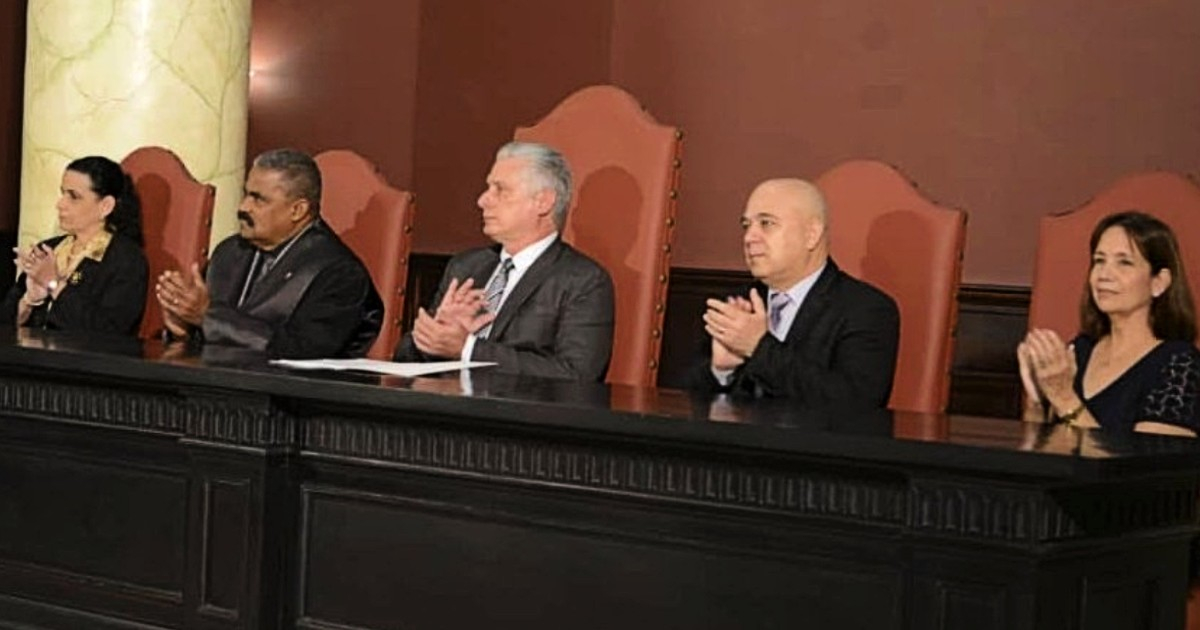
The opening ceremony of the 2023 judicial year was the perfect occasion for the Cuban rulerMiguel Diaz-Canel will make a prediction before the jurists gathered this Monday in the main hall of the Supreme People's Court.
“It will be an intense year, but we know that we can count on you,” said the also first secretary of the Communist Party of Cuba andresponsible for the “combat order” given to the repressive apparatus of the regime in response to the peaceful demonstrations that shook the country during the historic protests of July 11 and 12, 2021.
The challenge posed to the Cuban judicial system with theunprecedented social outbreak of 11J It was resolved in 2022 with an even more manifest subordination of the judicial power to the executive branch of the regime, further revealing the null separation of powers of the Cuban political system.
Although the appointment served for self-promotion and congratulations for the “law-making process” that marked the previous judicial year, experts and international and non-governmental organizations agree that judicial activity in 2022 was marked by an increase in repression in Cuba,both through the prosecution and punishment of activism and dissent, as in the approval of a new Penal Code that toughens penalties and expands the spectrum of crimes of a political nature.
"The government wants nothing that escapes its supervision. They have left nothing unregulated and criminalized", warned the independent organization Cubalex after the approval of the new Code in December.
According to the NGO, the Code constitutes a concern for all citizens, for different reasons: it classifies criminal, ambiguous, broad and discretionary conduct; defines around 32 crimes that threaten freedom of expression; and maintains the death penalty.
Furthermore, it classifies the use of cyberspace as an aggravating factor in criminal liability; pursues independent journalism as a crime; and places criminal responsibility from the age of 16, among other legal coercions.
For its part, at the end of the year, the organizationPrisoners Defenders indicated that until December 24, 2022 there were 1,034 political prisoners in Cuba. Among them 29 boys and 5 girls (34 minors in total) who are still serving sentences (27) or are being criminally prosecuted (7).
However, the president of the Supreme Court of Cuba did not mention a word about this reality,Rubén Remigio Ferro, despite the fact that both he and several of his subordinates areregular guests on national television programs -subordinated to the regime- to “explain” to citizens the criminal risks they run when expressing themselves freely.
“It has been our responsibility to judge those who, acting as pawns in the subversive attacks and attempts to destabilize the enemies of the Revolution, have committed acts of vandalism, violent attacks against authorities and officials, and other serious crimes,” said Ferro.during the opening ceremony of the last judicial year.
Days later, interviewed for the Cuban television newscast, the mother of one of the 11J protesters assured that “there is no need to try anything against the revolution"We must not throw stones, we must not attack the population or the police."
However, for Ferro, the important thing is to emphasize that "despite the complex circumstances that the country is experiencing, the administration of justice in Cuba moved at an adequate pace in 2022, with more than 85% of the matters processed being processed and concluded."
“I have seen the trial very well from all parties, the defense of the lawyers is very good, the prosecutor spoke as she had to speak, the president of the courtroom is objective, human… I have nothing more to say, because I have "seen the oral trial very well," added themother of the taken of 11J before the television cameras, in a report that closed by stating “the priority that public order, legality and citizen tranquility have for the country; and how they will act with rigor and firmness to ensure the conquests of the Revolution in any circumstance.”
In 2023, the determination and willingness of our people to overcome challenges will not be less, Ferro stated this Monday. “Nothing will take away the fervor, impetus and commitment that characterizes us, nor the healthy satisfaction that fulfilling our honorable role gives us.” For his part, Díaz-Canel "called to continue contributing new ideas in the administration of justice."
“Once again it is evident that the Cuban Judicial System is not independent. Impossible that in a country that seeks justiceThe Judicial System is subordinated to a political party", commented a Cuban social media user, responding to the Presidency thread that reported on an anachronistic and imposted event in the reality of a State that wields terror over its citizens.
What do you think?
SEE COMMENTS (1)Filed in: